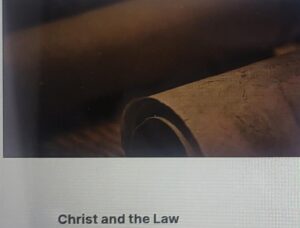
SUPPLEMENTAL SCRIPTURES
- Romans 10:4-9
- Galatians 2:16
- 1 Timothy 1:8-11
Matthew 5:17-20; Romans 8:3-4; Galatians 3:19-29
The word schoolmaster comes from the original Latin word paedagogus or pedagogue—the entrusted servant who watched over a boy until he was grown. The pedagogue’s duty was to protect the boy in all his activities. A schoolmaster held an important place but it was not intended that the schoolmaster be retained after the young man came to maturity. Thus it was with the Law of Moses. It was given by God and was good; it was needful for Israel until Christ came. But when Christ came, the days of the schoolmaster (the time of the Law) were completed.
QUESTIONS
- For what reason was the Mosaic Law given? See Galatians 3:19.
- For whom was the Law made? See 1 Timothy 1:9-10.
- The rituals of the sin offering as found in Leviticus 8:15 and Hebrews 9:19-22 pointed to sin. How did these also point to Christ? See Hebrews 13:11-12.
- What did Jesus mean when He said, “Think not that I am come to destroy the law, or the prophets: I am not come to destroy, but to fulfil”?
- The observance of the Law required more than ceremonial sacrifices. In Galatians 3:22-26, what is the key word used in every verse? Why was that word significant in the salvation of those under the Law, as well as in the salvation of us today? See Habakkuk 2:4 and Romans 1:17.
- What does it mean to be justified? Considering Galatians 2:16 and Galatians 3:24, by what are we justified?
- How does righteousness, which is by faith, operate? See Romans 10:9-10.
- What was one of the indirect results of the Law? See Acts 10:28. How was this indirect result abolished through Jesus Christ?
THEME THOUGHTS
The teachings of Jesus comprise the fundamental basis of our Christian beliefs. One of the most familiar accounts of those teachings is known as the Sermon on the Mount. It is recorded in chapters five through seven of the Book of Matthew. Shortly after choosing the twelve disciples, who would be His closest followers, Jesus led them to a hillside not far from Capernaum. There, just as God had given the Law to Moses on Mount Sinai to guide His people’s conduct and service, Jesus gave His disciples the Sermon on the Mount to guide their conduct and service to Him and His Father.The purpose of this quarter is to give an overall view of the Sermon on the Mount. There are many different topics mentioned in these three chapters, so the lessons you study will be considered highlights of these chapters.As you go through these lessons, you will notice other Scriptures are given in the text in addition to the portion of Scripture from the Sermon on the Mount. These will reinforce the subject that is being taught, which is also indicated by the lesson title. For example, the first lesson deals with humility and its spiritual value. The first five verses of Matthew 5 deal with more subjects than humility, but other portions of the text will zero in on that topic. May God bless you as you study these lessons, and help you apply what you learn to your own life.
